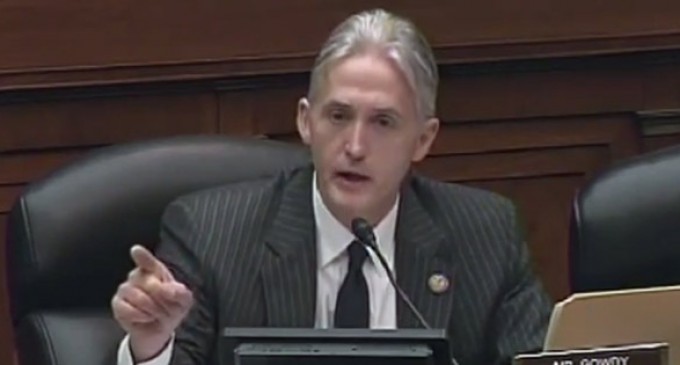
Here’s video of firebrand Trey Gowdy’s impassioned plea for Lois Lerner to be treated like any other witness. She should either offer testimony that will bear cross-examination or stand on her Fifth Amendment privilege against self-incrimination – but she should have to make a choice and not be able to benefit from both.
The House Oversight Committee’s decided Thursday morning to hold Lerner in contempt for refusing to testify before it. Gowdy and others recognize Lerner’s Fifth Amendment right, but claim she waived that right by effectively testifying on her own behalf. Check out the video below and see if Gowdy’s argument persuades you.
A defendant in a criminal trial can refuse to testify entirely or he can testify on his own behalf and then face cross-examination from the prosecution, but he can’t offer the jury his own story and then decline to answer questions from the other side. That’s exactly what Lerner did last year in her opening statement to the committee, says Gowdy. She made multiple assertions of fact — she’s innocent, has committed no crime, etc — and then, when Issa and company tried to cross-examine her, she clammed up. That’s the basis of the contempt charge. You can’t selectively invoke your privilege against self-incrimination.Or can you? Specifically, can you selectively invoke it in a civil proceeding like a congressional hearing even if you can’t do so in criminal court? Answer: It’s … hard to say. There isn’t much jurisprudence on the privilege in congressional settings. Ask six different lawyers and you might get six different opinions. Last year Alan Dershowitz said it was an open-and-shut case: Yes, Lerner had indeed constructively waived her privilege in an opening statement. Not so, said law prof James Duane: Witnesses have long been permitted to make “selective invocations” in civil proceedings (which are primarily about fact-finding rather than judgments of guilt), especially when they’ve been forced to appear against their will. Orin Kerr of the Volokh Conspiracy looked at the case law and found no clear answer; when he put the question to a law-prof listserv, most thought Lerner hadn’t waived her privilege although “opinions were somewhat mixed.”
Source: Hot Air
Photo: YouTube

Eric Holder and Obama should have been fired for Fast and Furious and their lies about fast and furious. Eric Holder and Obama should have been fired for using the IRS to intimidate and harrass patriots. Eric holder and Obama should have been fired for their abuse of their office to intimidate Zimmerman after his Trial. Eric holder and Obama should have been fired for their abuse of their office when they were trying to get a white guy committing the Knock Out Game prosecuted for a Hate Crime, it is Terrorism every time the Knock Out Game is played, Use the NDAA and lock the monsters away. Eric Holder lied to congress again, again, again, and again. He should have been fired for that. Barrack Obama should have been fired for our invasion of Libya. Barrack Obama should have been fired the first time he wrote an Executive Order that changed our Law. Barrack Obama should have been fired for his lies, he lied when he swore the Oath of Office, he had no intention of keeping his Oath, he hates our Constitution and our nation. Obama lied about NSA spying. Obama lied about Obamacare to get the House and Senate to vote for it. With our CIA and our NSA, Obama lied about Syria to try and get our Senate and House to approve bombing Syria. No Incumbents. They have not fired Eric Holder and Obama. Vote them out. George Soros and the National Endowment for Democracy funded the violence in the Ukraine with the blessing of Obama’s Administration. No Incumbents. The War on Terror is wrong and stupid, Obamacare is wong and stupid, and the Sanctions against Russia for trying to protect their people from the violence funded in the United States is wrong and stupid. No Incumbents.
The more I hearof him, the more I like him.
SOUNDS TO ME LIKE SHE IS SAYING, ” I AM GUILTY ” CHARGE HER WITH A CRIME…..
YES, AND GET RID OF THAT SCUMBAG APE CUMMINGS.
Why not
Yes she should be
TREY FOR SPEAKER!!!!!!!!!!!!!!!!!!!!
Trey thanks for bringin
Back some sanity to Gov.
ENOUGH TALKING JUST DO IT.